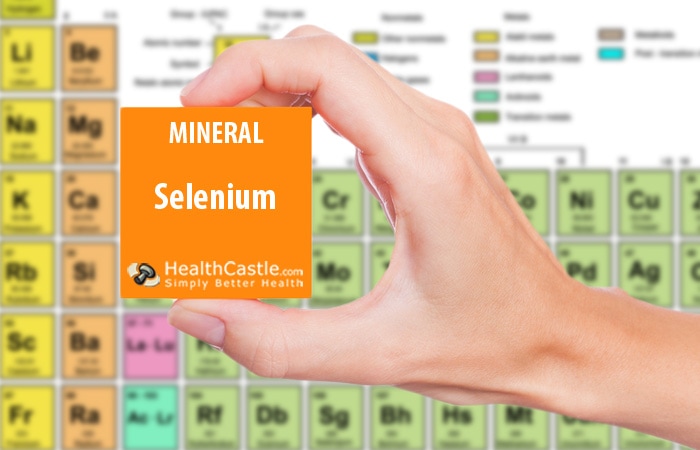
Written By: Carolyn Berry, RD
Title: Registered Dietitian
Alumni: University of British Columbia
Last Updated on:


Selenium is a trace mineral that functions as an antioxidant in the body. It also helps the thyroid and immune system to function properly and may help protect again some cancers.
Table of Contents
The Dietary Reference Intakes (DRI) for selenium are shown below:
| Age Group | Recommended Dietary Allowance (RDA) per Day1 | Tolerable Upper Intake Level (UL) per Day2 |
| Adults | ||
| 19 years and up | 55 mcg | 400 mcg |
| Kids and Youth | ||
| 1 to 3 years | 20 mcg | 90 mcg |
| 4 to 8 years | 30 mcg | 150 mcg |
| 9 to 13 years | 40 mcg | 280 mcg |
| 14 to 18 years | 55 mcg | 400 mcg |
| Special Considerations | ||
| Pregnant women 14 years and up | 60 mcg | 400 mcg |
| Lactating women 14 years and up | 70 mcg | 400 mcg |
Selenium helps prevent oxidative stress by working as an antioxidant to fight damaging particles in the body called free radicals. To accomplish this, selenium works together with a group of nutrients including Vitamin E, Vitamin C, glutathione, and niacin. Free radicals can damage cell membranes and DNA, and may contribute to aging and a number of conditions, including cancer.
Selenium plays an important role in thyroid function3 and immune system function4. Selenium is an essential mineral for maintaining proper function of the thyroid gland. Selenium is not only essential for the thyroid to produce the most active form of its hormone (called T3), but also helps regulate the amount of hormone produced.
Selenium may help protect against the development of some types of cancers5, but this is still being studied. Selenium has been shown to induce DNA synthesis6 and repair damaged cells, thus inhibiting the proliferation of cancer cells. Additionally, selenium is a component of many proteins, including glutathione peroxidase7, which is particularly important for cancer protection.
Selenium is present in soil; therefore, the amount of selenium in foods varies greatly depending on where the animal was raised or where the plant was grown. Brazil nuts are the most highly concentrated source of selenium. Meat, chicken, seafood, fish, eggs, grains, garlic, and mushrooms are also good sources of selenium.
| Food | Selenium per serving |
| Brazil nuts, 1/4 cup | 637 mcg |
| Oysters, Pacific, cooked, 3 oz | 131 mcg |
| Halibut, cooked, 3 oz | 47 mcg |
| Shrimp, cooked, 3 oz | 42 mcg |
| Salmon (Coho), cooked, 3 oz | 39 mcg |
| Turkey, cooked, 3 oz | 26 mcg |
| Cod, cooked, 3 oz | 24 mcg |
| Pasta, wheat, enriched, cooked, 1/2 cup | 20 mcg |
| Egg, cooked, 1 large | 15 mcg |
| Cereal, puffed wheat, 1 cup | 15 mcg |
| Chicken, cooked, 3 oz | 12 mcg |
| Mushrooms (portabella), raw, 1/2 cup chopped | 8 mcg |
| Garlic, raw, 3 cloves | 1-2 mcg |
In the United States: The % daily value gives you an idea of how much selenium is in the food you eat. The daily value for selenium is 55 mcg8. The number you see on the Nutrition Facts label is a percentage calculated by dividing the amount of selenium in one serving of the food by the DV. Using an example from the above table, 3 ounces of cooked halibut containing 47 mcg of selenium would have 85% of the DV for selenium. The FDA does not require that the % daily value for selenium be listed on the Nutrition Facts label.
In Canada: The daily value for selenium is 55 mcg9. Using the same example as above, 3 ounces of cooked halibut containing 47 mcg of selenium would have 85% of the DV for selenium. Listing the daily value for selenium on the Nutrition Facts label is optional.
Iron and copper: Iron and/or copper deficiency may increase the risk for selenium deficiency
HealthCastle has strict sourcing guidelines. We reference peer-reviewed studies, scientific journals and associations. We only use quality, credible sources to ensure content accuracy and integrity.
Alumni: University of British Columbia – Carolyn Berry is a Vancouver-based Registered Dietitian, self-proclaimed foodie, marathon runner, and owner of Berry Nourished. Carolyn works in a variety of areas including clinical nutrition, outpatient counselling at Medisys Preventive Health Clinic, as a nutrition tour leader with Save-On-Foods, and in the media, including segments on CBC Television, CKNW and Spice Radio. Through informative and practical nutrition advice and her food-first approach to health, Carolyn fulfills her passion to empower others with knowledge about nutrition so that they can make the best decisions to improve their health. She strongly believes that food should be both healthful and delicious.
antioxidant, immune booster, micronutrient - minerals, minerals, selenium, vitamins - minerals
Nutrition 101: Copper | Food List
Vegetable Oils with Omega-6 May Increase Risk of Heart Disease